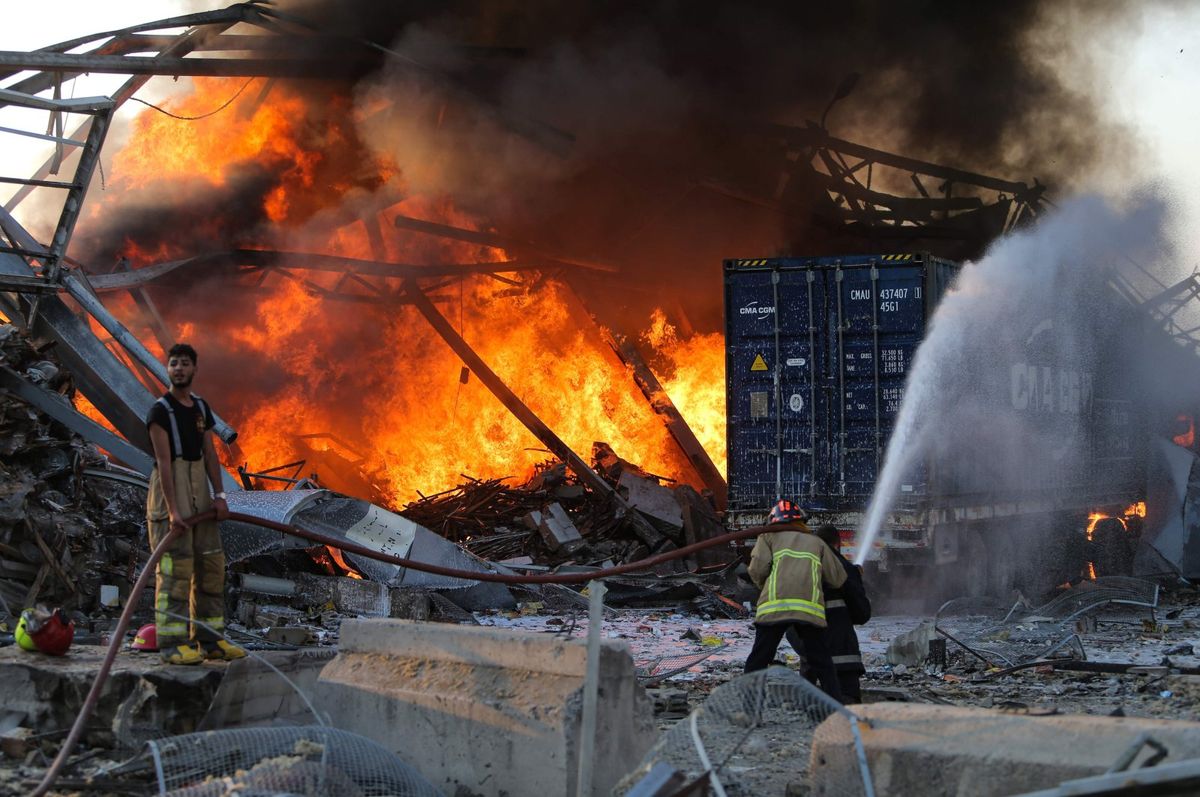Two powerful explosions tear through Lebanese capital of Beirut

A few minutes every morning is all you need.
Stay up to date on the world's Headlines and Human Stories. It's fun, it's factual, it's fluff-free.
Two powerful explosions rocked the port of Beirut, capital of Lebanon, on Tuesday evening in a blast that sent out seismic waves capable of shattering windows and leaving buildings in ruin.
The explosions killed at least 78 people and injured thousands more.
The disaster comes at a time when Lebanon was already on the brink of economic collapse and reeling from a surge in coronavirus infections.
“What we are witnessing is a huge catastrophe,” said George Kettani, the head of Lebanon’s Red Cross.
“There are victims and casualties everywhere.”
Hospitals around the city quickly became overwhelmed, admitting hundreds of patients into emergency rooms already over capacity while issuing pleas for blood donations, supplies and generators. Some patients had to be turned away and transported to hospitals outside of Lebanon for treatment.
Lebanese President Michel Aoun declared a two-week state of emergency in the capital, and called for military authorities to aid in the response. He also announced that he would release 100 billion Lebanese pounds (US$66.3 million) from the 2020 budget for emergency allocations.
The port near Beirut’s northern industrial waterfront where the explosion occured was surrounded by many important landmarks, including hospitals, mosques, churches and universities. The blasts erupted at or near a warehouse said to have contained nearly 2,700 tonnes of ammonium nitrate, a common industrial chemical typically used in fertilisers and bombs.
While investigations are still underway, many believe this to be the cause of the explosions. Authorities claim that the warehouse containing the ammonium nitrate stores has been subject to warnings dating back to 2014.
Prime Minister Hassan Diab said that he would “reveal facts” about the warehouse soon but did not want to preempt any investigation.
“I will not relax until we find the responsible party for what happened, hold it accountable and apply the most serious punishments against it,” Diab said. “It isn’t acceptable that a shipment of ammonium nitrate – estimated to be 2,750 tons – was in a depot for the past six years without precautionary measures being taken.”
The international community responds
United States President Donald Trump contradicted such reports from Lebanese officials, suggesting the Beirut explosions “looks like a terrible attack,” citing information from unnamed generals who “seem to feel that it was.”
The damage of the blasts was felt by the broader international community, with at least 48 UN staff reported injured, along with 27 of their dependents.
Australian Prime Minister Scott Morrison also confirmed that at least one Australian national had died as a result of the explosion, without revealing further details. The Australian embassy was also damaged.
Other governments reached out to offer their condolences and support, including the United Kingdom, France, Canada, Israel and Turkey.
The US embassy in Beirut warned residents of “reports of toxic gases released in the explosion,” advising people to wear masks and stay indoors. However, most of the windows in the area shattered on impact, making it difficult to avoid breathing outside air. Luckily, according to the American University of Beirut’s aerosol research lab, the air quality returned to “good” by 7pm in the evening.
Following the blasts and ensuing chaos, Lebanese residents were left wandering the streets in confusion, looking for missing loved ones and seeking shelter amongst the rubble.
“The rage is palpable,” said Leila Molana-Allen, Middle East correspondent for France 24 speaking to BBC World Service.
“Once people started to realise that this seemingly was the result of government neglect – obviously this is a country that has had months’ worth of protests about government ineptitude – the level to which rage and sorry now is spreading through the people, it’s indescribable.”
“Whether you talk about the economy, safety standards, the port, the corruption – none of the country’s issues have had a serious attempt at resolution,” said Elias Hankach, a parliamentarian of the Kataeb Party, a Lebanese Christian political group.
“We are living in this doomed management of the country.”
Have a tip or story? Get in touch with our reporters at tips@themilsource.com




Comments ()